Midweek Review
Sri Lanka’s ‘neutrality’ and the buildup in US-China tensions

By Lasanda Kurukulasuriya
In several interviews after his recent appointment as Secretary to the Foreign Ministry, Adm. (Retd.) Jayanath Colombage has sought to explain the newly-elected government’s thinking on matters of foreign policy. In these media interactions it is evident that he conveys the views of President Gotabaya Rajapaksa. The President has, on many occasions, referred to a concept of ‘neutrality’ in foreign relations. As Colombage describes it, there is no indication that neutrality is the same thing as Non-alignment, that Sri Lanka, a founding member of the Non-Aligned Movement, has long espoused.
Referring to a 20-point ‘foreign policy directive’ the ministry is in the process of drafting, he told Derana 24 TV channel that “number one is neutrality.” Where security is concerned, he said “we have an ‘India first’ policy.” He emphasized that Sri Lanka cannot afford to be a strategic security threat to India. “
Seeing that India is not the only big power vying for dominance in the region, a question that came up repeatedly in these interviews was how Sri Lanka would remain ‘neutral’ in the face of intense geopolitical rivalry, that involves the US, China and Japan. Turning the question around Colombage asked, can we be non-neutral, can we go with one country, including militarily? That would be suicidal, he said. Remaining neutral is ‘very difficult’ but can be done, he asserted.
US sanctions
It’s not be possible to assess if this is a realistic approach to the geopolitical challenge faced by Sri Lanka, without taking into consideration a drift that has seen Indian policy increasingly come under the influence of the US. India has been designated a major defence partner of the US, and works towards inter-operability of its military with those of the US through key defence agreements. At the same time the US increasingly looks to its regional allies and partners to shoulder responsibility in achieving, what it calls, ‘shared goals’ in the region it has labelled the ‘Indo Pacific.’ In recent times the superpower has gone beyond its usual sabre-rattling against China to make moves on both military and economic fronts, that some analysts interpret as nothing short of preparation for war.
On the economic front, the US Commerce Department has announced sanctions against 24 Chinese state owned companies, including subsidiaries of the China Communications Construction Company Ltd (CCCC), “for their role in South China Sea activities,” according to the transcript of a US State Department briefing. CCCC’s role in China’s Belt and Road initiative, in which Sri Lanka is a participant, is also mentioned. It’s not clear whether the China Harbour Engineering Company (CHEC) which is building the Colombo Port City, is among the targeted subsidiaries. The ‘activities’ refer to China’s constructions on islands in the disputed South China Sea, over which China claims sovereignty. This is “the first punitive action of its kind over the disputed waters,” CNN reported, adding that it is “one that is almost certain to escalate tensions between the countries.”
In the defence sphere, the US has sought a more formal NATO-type alliance with the Quad – a group comprising the US, India, Japan and Australia. The US’s goal is to get these countries to work together “as a bulwark against a potential challenge from China,” a senior State Dept. official reportedly said on Monday (August 31). The official had mentioned the upcoming Autumn meeting of the four in Delhi, citing the possibility of Australia’s participation in the annual Malabar naval exercise as ‘an example of progress towards a more formal defense bloc.’
Phone call to President
It is against this background that US Secretary of Defense Mark Esper made a call to President Gotabaya Rajapaksa on August 30. A US Department of Defence (US-DoD) readout on the phone call, after congratulating the president for his handling of the Covid-19 pandemic and the parliamentary election victory, went on to say: “The two leaders discussed their shared commitment to a free and open Indo-Pacific that ensures the sovereignty of all nations. Reviewing common bilateral defense priorities, they noted opportunities to enhance military professionalization, counter-terrorism, and maritime security cooperation. Both leaders expressed their commitment to expanding bilateral defense relations and to advancing shared interests.”
Although the US language refers to ‘shared commitment (to a free and open Indo Pacific),’ ‘common bilateral defense priorities’ and ‘shared interests,’ Sri Lanka has not used similar terminology. There is no clarity as to what these terms mean. Sri Lanka has been reticent on the concept of ‘free and open Indo Pacific.’ President Gotabaya in his tweet thanking Esper for the good wishes, merely said “Discussion on cooperation with Indian Ocean and neighbour relations, defense, military to military linkages & counter terrorism, whilst strengthening bilateral relations was very assuring.”
Complex backdrop
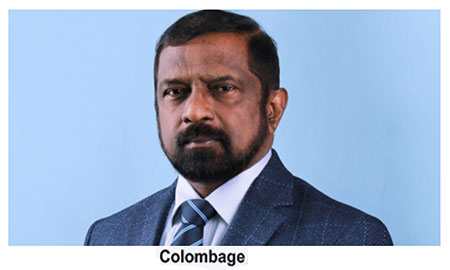 The US Def. Sec.’s phone call did not come out of the blue. It followed a string of diplomatic interactions in the Asia Pacific region, which he concluded by tweeting that “The United States will compete, deter, and win in the #IndoPacific. …” Win what, we need to ask. Earlier the Wall Street Journal published an article by Esper titled ‘The Pentagon is ready for China.’ The military overtones are unmistakable.
The US Def. Sec.’s phone call did not come out of the blue. It followed a string of diplomatic interactions in the Asia Pacific region, which he concluded by tweeting that “The United States will compete, deter, and win in the #IndoPacific. …” Win what, we need to ask. Earlier the Wall Street Journal published an article by Esper titled ‘The Pentagon is ready for China.’ The military overtones are unmistakable.
In Guam, where the US has a military base, Esper met Japan’s Defence Minister Taro Kono. According to a US-DoD statement they “exchanged views on their shared vision for a free and open Indo-Pacific region. The Secretary expressed serious concern regarding Beijing’s decision to impose a national security law in Hong Kong, as well as coercive and destabilizing actions vis-à-vis Taiwan.”
In virtual bilateral talks with Singapore, Esper expressed appreciation to Singapore’s Defence Minister, for renewal of an MoU on use of facilities, the US-DoD said.
Meanwhile, on Twitter, he referred to his call to the Defence Minister of Papua New Guinea – where he anticipates the conclusion of a Defense Cooperation Agreement. He also tweeted about his visit to Palau – whose defence minister he met, his call to the Governor of CNMI (Commonwealth of the Northern Mariana Islands), and meeting with the Governor of Guam, lauding the security role of these tiny Pacific islands,
Esper’s phone call to Gotabaya Rajapaksa was the last in this string of diplomatic manouvres, end August.
Given the thrust of his exercise of touching base in locations where the US has, or hopes to have military facilities to use against China, it would be fair to assume that in Sri Lanka, the US is intensifying pressure to conclude the MCC compact and SOFA (Status of Forces Agreement). Both face intense public opposition due to threats to sovereignty, but the new government is yet to categorically reject them.
Reports say US Secretary of State Mike Pompeo is expected to meet with his counterparts from the Quad countries, in Delhi, Sept-Oct. this year. While it is true that India prides itself in its strategic autonomy, its defence ties with the US are being steadily strengthened. The recent India-China border clash in Ladakh could further tilt the scales. Will India end up a US proxy in the Indian Ocean region? The answers to these questions are not straightforward. What’s clear is that there’s a backdrop of complex variables, against which Sri Lanka asserts that it will remain ‘neutral,’ and yet follow an ‘India first’ policy. Given Sri Lanka’s economic ties and friendship with China, alongside a stated policy of ‘friendship with all,’ we need to ask – is it possible?
- News Advertiesment
See Kapruka’s top selling online shopping categories such as Toys, Grocery, Flowers, Birthday Cakes, Fruits, Chocolates, Clothing and Electronics. Also see Kapruka’s unique online services such as Money Remittence,News, Courier/Delivery, Food Delivery and over 700 top brands. Also get products from Amazon & Ebay via Kapruka Gloabal Shop into Sri Lanka.
Midweek Review
‘Professor of English Language Teaching’
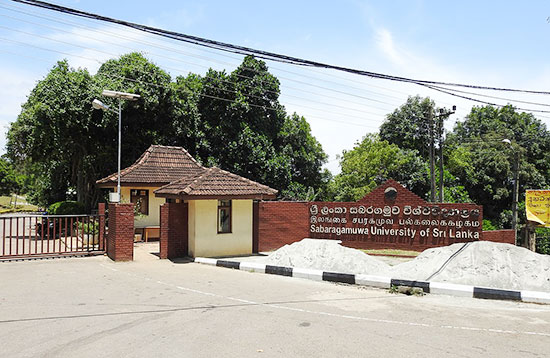
It is a pleasure to be here today, when the University resumes postgraduate work in English and Education which we first embarked on over 20 years ago. The presence of a Professor on English Language Teaching from Kelaniya makes clear that the concept has now been mainstreamed, which is a cause for great satisfaction.
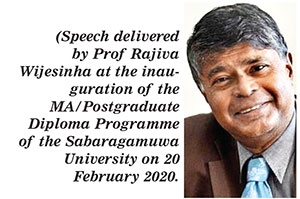 Twenty years ago, this was not the case. Our initiative was looked at askance, as indeed was the initiative which Prof. Arjuna Aluwihare engaged in as UGC Chairman to make degrees in English more widely available. Those were the days in which the three established Departments of English in the University system, at Peradeniya and Kelaniya and Colombo, were unbelievably conservative. Their contempt for his efforts made him turn to Sri Jayewardenepura, which did not even have a Department of English then and only offered it as one amongst three subjects for a General Degree.
Twenty years ago, this was not the case. Our initiative was looked at askance, as indeed was the initiative which Prof. Arjuna Aluwihare engaged in as UGC Chairman to make degrees in English more widely available. Those were the days in which the three established Departments of English in the University system, at Peradeniya and Kelaniya and Colombo, were unbelievably conservative. Their contempt for his efforts made him turn to Sri Jayewardenepura, which did not even have a Department of English then and only offered it as one amongst three subjects for a General Degree.
Ironically, the most dogmatic defence of this exclusivity came from Colombo, where the pioneer in English teaching had been Prof. Chitra Wickramasuriya, whose expertise was, in fact, in English teaching. But her successor, when I tried to suggest reforms, told me proudly that their graduates could go on to do postgraduate degrees at Cambridge. I suppose that, for generations brought up on idolization of E. F. C. Ludowyke, that was the acme of intellectual achievement.
I should note that the sort of idealization of Ludowyke, the then academic establishment engaged in was unfair to a very broadminded man. It was the Kelaniya establishment that claimed that he ‘maintained high standards, but was rarefied and Eurocentric and had an inhibiting effect on creative writing’. This was quite preposterous coming from someone who removed all Sri Lankan and other post-colonial writing from an Advanced Level English syllabus. That syllabus, I should mention, began with Jacobean poetry about the cherry-cheeked charms of Englishwomen. And such a characterization of Ludowyke totally ignored his roots in Sri Lanka, his work in drama which helped Sarachchandra so much, and his writing including ‘Those Long Afternoons’, which I am delighted that a former Sabaragamuwa student, C K Jayanetti, hopes to resurrect.
I have gone at some length into the situation in the nineties because I notice that your syllabus includes in the very first semester study of ‘Paradigms in Sri Lankan English Education’. This is an excellent idea, something which we did not have in our long-ago syllabus. But that was perhaps understandable since there was little to study then except a history of increasing exclusivity, and a betrayal of the excuse for getting the additional funding those English Departments received. They claimed to be developing teachers of English for the nation; complete nonsense, since those who were knowledgeable about cherries ripening in a face were not likely to move to rural areas in Sri Lanka to teach English. It was left to the products of Aluwihare’s initiative to undertake that task.
Another absurdity of that period, which seems so far away now, was resistance to training for teaching within the university system. When I restarted English medium education in the state system in Sri Lanka, in 2001, and realized what an uphill struggle it was to find competent teachers, I wrote to all the universities asking that they introduce modules in teacher training. I met condign refusal from all except, I should note with continuing gratitude, from the University of Sri Jayewardenepura, where Paru Nagasunderam introduced it for the external degree. When I started that degree, I had taken a leaf out of Kelaniya’s book and, in addition to English Literature and English Language, taught as two separate subjects given the language development needs of students, made the third subject Classics. But in time I realized that was not at all useful. Thankfully, that left a hole which ELT filled admirably at the turn of the century.
The title of your keynote speaker today, Professor of English Language Teaching, is clear evidence of how far we have come from those distant days, and how thankful we should be that a new generation of practical academics such as her and Dinali Fernando at Kelaniya, Chitra Jayatilleke and Madhubhashini Ratnayake at USJP and the lively lot at the Postgraduate Institute of English at the Open University are now making the running. I hope Sabaragamuwa under its current team will once again take its former place at the forefront of innovation.
To get back to your curriculum, I have been asked to teach for the paper on Advanced Reading and Writing in English. I worried about this at first since it is a very long time since I have taught, and I feel the old energy and enthusiasm are rapidly fading. But having seen the care with which the syllabus has been designed, I thought I should try to revive my flagging capabilities.
However, I have suggested that the university prescribe a textbook for this course since I think it is essential, if the rounded reading prescribed is to be done, that students should have ready access to a range of material. One of the reasons I began while at the British Council an intensive programme of publications was that students did not read round their texts. If a novel was prescribed, they read that novel and nothing more. If particular poems were prescribed, they read those poems and nothing more. This was especially damaging in the latter case since the more one read of any poet the more one understood what he was expressing.
Though given the short notice I could not prepare anything, I remembered a series of school textbooks I had been asked to prepare about 15 years ago by International Book House for what were termed international schools offering the local syllabus in the English medium. Obviously, the appalling textbooks produced by the Ministry of Education in those days for the rather primitive English syllabus were unsuitable for students with more advanced English. So, I put together more sophisticated readers which proved popular. I was heartened too by a very positive review of these by Dinali Fernando, now at Kelaniya, whose approach to students has always been both sympathetic and practical.
I hope then that, in addition to the texts from the book that I will discuss, students will read other texts in the book. In addition to poetry and fiction the book has texts on politics and history and law and international relations, about which one would hope postgraduate students would want some basic understanding.
Similarly, I do hope whoever teaches about Paradigms in English Education will prescribe a textbook so that students will understand more about what has been going on. Unfortunately, there has been little published about this but at least some students will I think benefit from my book on English and Education: In Search of Equity and Excellence? which Godage & Bros brought out in 2016. And then there was Lakmahal Justified: Taking English to the People, which came out in 2018, though that covers other topics too and only particular chapters will be relevant.
The former book is bulky but I believe it is entertaining as well. So, to conclude I will quote from it, to show what should not be done in Education and English. For instance, it is heartening that you are concerned with ‘social integration, co-existence and intercultural harmony’ and that you want to encourage ‘sensitivity towards different cultural and linguistic identities’. But for heaven’s sake do not do it as the NIE did several years ago in exaggerating differences. In those dark days, they produced textbooks which declared that ‘Muslims are better known as heavy eaters and have introduced many tasty dishes to the country. Watalappam and Buriani are some of these dishes. A distinguished feature of the Muslims is that they sit on the floor and eat food from a single plate to show their brotherhood. They eat string hoppers and hoppers for breakfast. They have rice and curry for lunch and dinner.’ The Sinhalese have ‘three hearty meals a day’ and ‘The ladies wear the saree with a difference and it is called the Kandyan saree’. Conversely, the Tamils ‘who live mainly in the northern and eastern provinces … speak the Tamil language with a heavy accent’ and ‘are a close-knit group with a heavy cultural background’’.
And for heaven’s sake do not train teachers by telling them that ‘Still the traditional ‘Transmission’ and the ‘Transaction’ roles are prevalent in the classroom. Due to the adverse standard of the school leavers, it has become necessary to develop the learning-teaching process. In the ‘Transmission’ role, the student is considered as someone who does not know anything and the teacher transmits knowledge to him or her. This inhibits the development of the student.
In the ‘Transaction’ role, the dialogue that the teacher starts with the students is the initial stage of this (whatever this might be). Thereafter, from the teacher to the class and from the class to the teacher, ideas flow and interaction between student-student too starts afterwards and turns into a dialogue. From known to unknown, simple to complex are initiated and for this to happen, the teacher starts questioning.’
And while avoiding such tedious jargon, please make sure their command of the language is better than to produce sentences such as these, or what was seen in an English text, again thankfully several years ago:
Read the story …
Hello! We are going to the zoo. “Do you like to join us” asked Sylvia. “Sorry, I can’t I’m going to the library now. Anyway, have a nice time” bye.
So Syliva went to the zoo with her parents. At the entrance her father bought tickets. First, they went to see the monkeys
She looked at a monkey. It made a funny face and started swinging Sylvia shouted: “He is swinging look now it is hanging from its tail its marvellous”
“Monkey usually do that’
I do hope your students will not hang from their tails as these monkeys do.
Midweek Review
Little known composers of classical super-hits
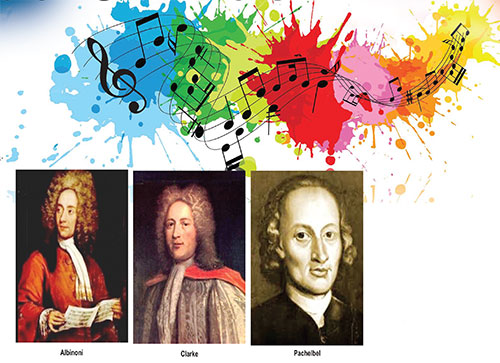
By Satyajith Andradi
Quite understandably, the world of classical music is dominated by the brand images of great composers. It is their compositions that we very often hear. Further, it is their life histories that we get to know. In fact, loads of information associated with great names starting with Beethoven, Bach and Mozart has become second nature to classical music aficionados. The classical music industry, comprising impresarios, music publishers, record companies, broadcasters, critics, and scholars, not to mention composers and performers, is largely responsible for this. However, it so happens that classical music lovers are from time to time pleasantly struck by the irresistible charm and beauty of classical pieces, the origins of which are little known, if not through and through obscure. Intriguingly, most of these musical gems happen to be classical super – hits. This article attempts to present some of these famous pieces and their little-known composers.
Pachelbel’s Canon in D
The highly popular piece known as Pachelbel’s Canon in D constitutes the first part of Johann Pachelbel’s ‘Canon and Gigue in D major for three violins and basso continuo’. The second part of the work, namely the gigue, is rarely performed. Pachelbel was a German organist and composer. He was born in Nuremburg in 1653, and was held in high esteem during his life time. He held many important musical posts including that of organist of the famed St Stephen’s Cathedral in Vienna. He was the teacher of Bach’s elder brother Johann Christoph. Bach held Pachelbel in high regard, and used his compositions as models during his formative years as a composer. Pachelbel died in Nuremburg in 1706.
Pachelbel’s Canon in D is an intricate piece of contrapuntal music. The melodic phrases played by one voice are strictly imitated by the other voices. Whilst the basso continuo constitutes a basso ostinato, the other three voices subject the original tune to tasteful variation. Although the canon was written for three violins and continuo, its immense popularity has resulted in the adoption of the piece to numerous other combinations of instruments. The music is intensely soothing and uplifting. Understandingly, it is widely played at joyous functions such as weddings.
Jeremiah Clarke’s Trumpet Voluntary
The hugely popular piece known as ‘Jeremiah Clarke’s Trumpet Voluntary’ appeared originally as ‘ The Prince of Denmark’s March’ in Jeremiah Clarke’s book ‘ Choice lessons for the Harpsichord and Spinet’, which was published in 1700 ( Michael Kennedy; Oxford Dictionary of Music ). Sometimes, it has also been erroneously attributed to England’s greatest composer Henry Purcell (1659 – 1695 ) and called ‘Purcell’s Trumpet Voluntary (Percy A. Scholes ; Oxford Companion to Music). This brilliant composition is often played at joyous occasions such as weddings and graduation ceremonies. Needless to say, it is a piece of processional music, par excellence. As its name suggests, it is probably best suited for solo trumpet and organ. However, it is often played for different combinations of instruments, with or without solo trumpet. It was composed by the English composer and organist Jeremiah Clarke.
Jeremiah Clarke was born in London in 1670. He was, like his elder contemporary Pachelbel, a musician of great repute during his time, and held important musical posts. He was the organist of London’s St. Paul’s Cathedral and the composer of the Theatre Royal. He died in London in 1707 due to self – inflicted gun – shot injuries, supposedly resulting from a failed love affair.
Albinoni’s Adagio
The full title of the hugely famous piece known as ‘Albinoni’s Adagio’ is ‘Adagio for organ and strings in G minor’. However, due to its enormous popularity, the piece has been arranged for numerous combinations of instruments. It is also rendered as an organ solo. The composition, which epitomizes pathos, is structured as a chaconne with a brooding bass, which reminds of the inevitability and ever presence of death. Nonetheless, there is no trace of despondency in this ethereal music. On the contrary, its intense euphony transcends the feeling of death and calms the soul. The composition has been attributed to the Italian composer Tomaso Albinoni (1671 – 1750), who was a contemporary of Bach and Handel. However, the authorship of the work is shrouded in mystery. Michael Kennedy notes: “The popular Adagio for organ and strings in G minor owes very little to Albinoni, having been constructed from a MS fragment by the twentieth century Italian musicologist Remo Giazotto, whose copyright it is” (Michael Kennedy; Oxford Dictionary of Music).
Boccherini’s Minuet
The classical super-hit known as ‘Boccherini’s Minuet’ is quite different from ‘Albinoni’s Adagio’. It is a short piece of absolutely delightful music. It was composed by the Italian cellist and composer Luigi Boccherini. It belongs to his string quintet in E major, Op. 13, No. 5. However, due to its immense popularity, the minuet is performed on different combinations of instruments.
Boccherini was born in Lucca in 1743. He was a contemporary of Haydn and Mozart, and an elder contemporary of Beethoven. He was a prolific composer. His music shows considerable affinity to that of Haydn. He lived in Madrid for a considerable part of his life, and was attached to the royal court of Spain as a chamber composer. Boccherini died in poverty in Madrid in 1805.
Like numerous other souls, I have found immense joy by listening to popular classical pieces like Pachelbel’s Canon in D, Jeremiah Clarke’s Trumpet Voluntary, Albinoni’s Adagio and Boccherini’s Minuet. They have often helped me to unwind and get over the stresses of daily life. Intriguingly, such music has also made me wonder how our world would have been if the likes of Bach, Handel, Haydn, Mozart, Beethoven, and Schubert had never lived. Surely, the world would have been immeasurably poorer without them. However, in all probability, we would have still had Pachelbel’s Canon in D, Jeremiah Clarke’s Trumpet Voluntary, Albinoni’s Adagio, and Boccherini’s Minuet, to cheer us up and uplift our spirits.
Midweek Review
The Tax Payer and the Tough
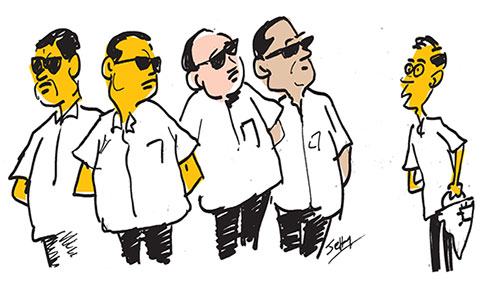
By Lynn Ockersz
The tax owed by him to Caesar,
Leaves our retiree aghast…
How is he to foot this bill,
With the few rupees,
He has scraped together over the months,
In a shrinking savings account,
While the fires in his crumbling hearth,
Come to a sputtering halt?
But in the suave villa next door,
Stands a hulk in shiny black and white,
Over a Member of the August House,
Keeping an eagle eye,
Lest the Rep of great renown,
Be besieged by petitioners,
Crying out for respite,
From worries in a hand-to-mouth life,
But this thought our retiree horrifies:
Aren’t his hard-earned rupees,
Merely fattening Caesar and his cohorts?









